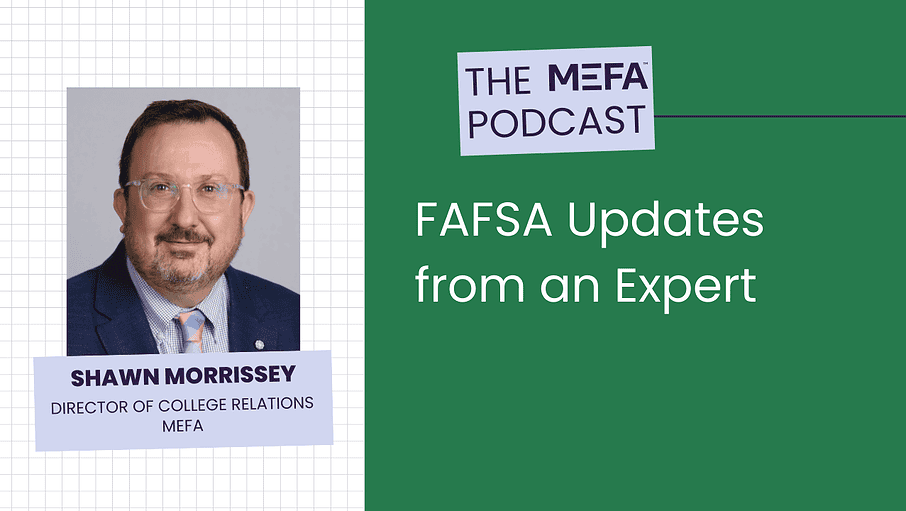

Resources Mentioned in this Episode
Shawn Morrissey: [00:00:00] So if you need to borrow any additional loans parent loan, those types of things, you want to start looking into them. As soon as you can estimate that and apply for the most you think you’re going to need and then adjust that downward as the bill becomes due.
Jonathan Hughes: Hello everyone and welcome to The MEFA Podcast. My name is Jonathan Hughes. Today on our show, we have MEFA’s Director of College Relations. Shawn Morrissey on to talk to families who are trying to make a decision about where they want to go to college when they may not have complete financial aid offers from all their colleges yet. So it’s very timely. I’ll be back with the wrap up after the conversation.
So this is the time of year when MEFA offers [00:01:00] our Paying the College Bill campaign, where we help families decode and compare their financial aid and admissions offers from colleges. This is what we normally do this time of year, but this is not a normal year as we all know, so many families don’t have any financial aid offers from their colleges yet.
This is of course because of the FAFSA delays. Now the last time our guest was on here, we talked about what was going on With the FAFSA, the problems that families were having and what they could do about that. So here to help us through that topic again, as well as how families can You know estimate their aid offers and how they can prepare financially for the year coming up is MEFA’s Director of College Relations Shawn Morrissey. Hi Shawn!
Shawn Morrissey: Hi Jonathan, happy to be here.
Jonathan Hughes: I remember the last time we were on, we talked about what was going on with the FAFSA and that none of the FAFSA information had been sent to the colleges, among other things. What has [00:02:00] changed with the FAFSA since the last time you were here? What’s going on with it now?
Shawn Morrissey: Okay, I’ll start with the good news. So the backlog of FAFSAs that hadn’t been processed and hadn’t been sent to schools, those have been processed and they have been sent to schools. The bad news is not all of that information is completely correct. And some of that needs to be reprocessed by FSA before colleges can really have accurate information.
So schools are still working through Finding out which FAFSA information is correct and awarding students their financial aid. Financial aid offer letters are still delayed. There are some schools that have sent them out mostly schools that use the CSS profile form, which are usually larger private institutions and they have sent out financial aid offers to [00:03:00] large numbers of students.
Other schools are still waiting to get all of the accurate data from the FAFSAs in order to generate awards to students, and they’re hoping to have that out as soon as possible. Financial aid administrators are as frustrated as families are about this whole process, and they really want to get accurate information to students.
So their concern is they don’t want to send out information to students. And then have to go back in a month or so and revise that and have families make decisions based on inaccurate information. So they’re trying to do the best for families to get information out to them as accurately and as quickly as they possibly can once they finally get the information.
Jonathan Hughes: There have been some other fixes that have been announced by the federal government for some. Known issues. Can we talk about that a little bit?
Shawn Morrissey: Yes, definitely. The other good news [00:04:00] is the correction process, which has been delayed. Usually the correction process, so you can make corrections to your FAFSA as soon as the FAFSA opens. For this year, the correction process has been delayed. And it kept getting pushed back, but it is now available in a soft launch. So just the FAFSA in late December and early January, where it was up for a couple of hours and then went down to have some fixes done, you’re going to see that with the corrections as well right now.
So for this week it’s going to be a soft launch where the, it will be Up and down, but then they promise that it would be much more readily available for everybody. And available all the time. And that’s good news because there are a lot of students that were in the situation where their FAFSA was submitted, but not complete.
So they needed to add a signature to that, [00:05:00] or they may have answered a question wrong. One of the main questions that a lot of families were answering improperly was, do you want to apply for the undisclosed? subsidized loan only and students were checking yes to that thinking that would give them the ability to apply for the unsubsidized loan.
But what that really does is it bypasses all parental information being added on the FAFSA and allows them only to get the unsubsidized loan and not any other type of federal aid. So if students did erroneously answer that question, they will have the ability to go back and answer that question as no, and invite their parents to Put their information back on the FAFSA and fix that error.
And if there were signatures that were missing, you can go back in and fix that. If there are additional schools that you want to add, you can go into the correction process and do that at this time as well. So that the correction [00:06:00] process has become available. There is also an issue for families that had contributors that didn’t have a social security number.
And there were a lot of issues where They were getting stuck in loops or they weren’t able to even get an FSA ID easily and the department has announced that those problems have been solved and there is help on the website to help families through that whole process now for contributors without social security numbers. They should be able to go back in now and. Try that process again and successfully submit their FAFSA.
Jonathan Hughes: That’s good. It’s good to have some good news regarding the FAFSA and some fixes that are coming out. I did think of when you were talking about this, I spoke with a mom who is in one of the situations that you described, which is that her son inadvertently clicked that.
Yes, I want to apply for the unsubsidized direct loan, and [00:07:00] thus they were locked out of being able to contribute parental information. And so they were coming up against it, as far as the deadline is concerned, to deposit at a college, and they hadn’t yet been able to file. And so I think that is representative of a lot of families and where they are right now.
Because. They don’t have a clear idea of what their aid is going to be for one reason or another from all of their colleges, and they have to make a decision soon about where they’re going to go because they do have that deposit date at colleges. So what would you advise? And I know it’s difficult, but what would you advise those families?
Shawn Morrissey: First of all check in with your college. A lot of colleges are extending their deadlines, their deposit deadlines as well as their financial aid deadlines. And just see if you have a little bit of a budget. Longer on that to deposit based on them moving their deadlines because schools are very aware of all the issues [00:08:00] that families are having with the FAFSA.
So they’re working closely with families. If they haven’t moved their deadline officially I would contact the financial aid office and speak to them because they might have some individual leeway in it in this year to extend a deadline for, Individuals as well. I know that a lot of schools are trying to use as much flexibility as possible this year because they understand all the issues.
They are there in the trenches with families trying to get through all of these issues as well and are trying to find solutions and they don’t want families to be left out. Because they’ve missed deadlines through no fault of their own. Certainly if you’ve done everything that you possibly can that’s not always your fault this year that you’ve missed a deadline.
Jonathan Hughes: Yeah. So, FAFSA deadlines are later at some colleges deposit dates. Are later this year at some [00:09:00] colleges. The next thing to drop in that calendar is, of course, that the bills. So what about the next step of the actual bill being sent for the upcoming fall semester?
Shawn Morrissey: Yeah, so there is discussion I’ve heard among colleges to extend that deadline as well. They’re really watching that closely. I haven’t heard of many schools that have made that announcement yet. That’s a little bit later. Usually in the year, sometimes July 1st, sometimes August 1st. They’re hoping to be able to stick to those deadlines, but they are watching that very closely and may announce later dates if they feel that families need that additional time to determine how they’re going to finance for this year.
Jonathan Hughes: And so all these things being different, some big things are still the same this year, which is families do have to make a payment, make a deposit, figure out how they’re going to pay for college, make a choice, and get all of that stuff done.
And timing is always [00:10:00] a popular question, when should I borrow a loan? When do I need to start applying? When do I need to start looking at the payment plans? What’s this sort of timeline like? And so this year being a little bit different when should parents start, thinking about when can they start looking into these options of if they know how much they need to borrow, or if they want to estimate, how do they get this all straight in their head at this time?
Shawn Morrissey: Sure. Families can start that process at any time when they’re looking into, Financing options, but certainly you should think of doing it. No later than 2 weeks before the bill is due. So you want to get that process done. If you need to get any type of financing above what the is already listed on the student’s financial aid offer. So if you need to borrow any additional loans, parent loans, those types of things, you [00:11:00] want to start looking into them as soon as you can, but certainly two weeks before school starts. And you can always estimate that and apply for the most you think you’re going to need and then adjust that downward.
As the bill becomes due certainly for in most cases, all of the loans are used as a placeholder when the bill is due, but they’re not actually dispersed until the student is in school in most cases. So you do have some time between when the bill is due and when the loan is actually dispersed where you can adjust that if needed downward for that loan.
So if you estimate that on the high side, and then you can adjust that downward later on, if you need to, if there are other sources that you can use and for. Student payment plans so for the payment plans on the bill.
Jonathan Hughes: Yeah, can we take I’m sorry to interrupt you but can you just talk about a little bit about what payment plans are in case people don’t know [00:12:00] because I’m always surprised that the number of parents who don’t know what they are.
Shawn Morrissey: So most schools offer a payment plan which usually The there’ll be a small enrollment fee. There’s no interest on that, but there’s usually like a 50 to 75 enrollment fee on that. And then you would what it does is you elect to take a portion of that of the bill or the entire amount of the bill, and you can break that up over 10 months, 12 months, depending on when you start the payment plan. So if you start that in June, you can sometimes get the 12 months out of that doing it June to June, depending on the school. If you start that in August, you can sometimes do a 10 month payment plan. So instead of making lump sum payments for that bill, you’re breaking that down into smaller payments over the year.
So yeah, so this year, because if billing dates are pushed back later on So if you would normally have a July 1st deadline, then you [00:13:00] could start a payment plan that begins in July. And have 10 or 11 months to pay on that. If due dates are starting in August and you don’t start that payment plan until August, that’s 1 month last that you may have available in that payment plan.
If that’s the case, you may want to. Put aside that amount of that payment plan that you would have paid in July and then use that once the payment plan is active to, to pay those larger sums because every time that you take a month off of that, each month’s payments going to be a little larger than it would have been if you had more months to divide that amount over leaving people with something positive here.
Jonathan Hughes: As I said, I talked to a lot of families who are anxious because they have deadlines and they don’t know how much aid they’re going to receive and they, it’s going to impair their ability to make a good choice perhaps or a choice based on all the data that they should have. I think a lot of families are worried about getting stuck in the [00:14:00] gears of everything that’s going on. What can we do?
Shawn Morrissey: There’s a lot of help out there. So MEFA, we’re doing a series of FAFSA correction event events to help families through the correction process that they do need to go and make corrections to adding their signature or changing a wrong question, adding schools, anything like that. We’re doing a series of those.
There are also some FAFSA day events to help families that. Haven’t started the FAFSA or started the FAFSA and we’re never able to submit because they were receiving errors or problems with the FAFSA. In addition to that, we do have some webinars coming up through MIFA as well about. paying the college bill, and the next steps in the process with that as well.
And we always have one on one appointments available for students that are having individual problems and they want to discuss that with someone at MEFA that can help them through those [00:15:00] problems. Schools are doing reach out to students, too, for they see that students have made errors. I know a lot of schools are going to be proactively reaching out to students who answered yes to that unsubsidized question, knowing that was probably an error and trying to help them through that.
Also, schools are very busy right now trying to do six months of work in one month. So I hesitate to say to reach out to schools, but they really do want to help students. So if you really do have a big issue and you want to speak with the school, certainly reach out to them, but you just be patient because it’s not that they’re ignoring you.
They’re just really busy and But once they are able to, they will help you as well with these situations because they understand what students are going through with this process. And that it’s been a very difficult year and they really want students to have the correct information to help them make decisions. [00:16:00] But there, there is still a lot of help out there for families.
Jonathan Hughes: Is there anything else you want to say before we go? I think we covered it. All right, Shawn. Thank you so much.
Shawn Morrissey: Okay, thank you, Jonathan.
Jonathan Hughes: All right, Shawn. Thank you very much for being here. I really enjoyed that conversation. And folks, if you liked what you heard today, and you want to hear more from us on planning, saving, and paying for college then you can follow the show. And you can do that wherever you get your podcasts. Please remember to review us because it does help us to keep doing what we’re doing and getting this show out to folks like you.
I want to thank Shaun Connolly, our producer. I want to thank AJ Yee, Lisa Rooney, and Lauren Danz for their assistance in getting the show posted so you can listen to it. Once again, my name is Jonathan Hughes and this has been The MEFA [00:17:00] Podcast.












